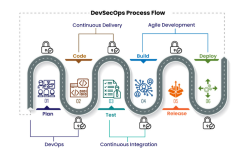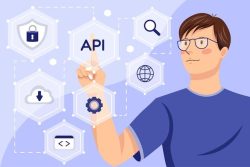Top 7 Challenges Solved by DevSecOps Consulting Services

Audio : Listen to This Blog.
DevSecOps Consulting Services bridges this gap by integrating security from the start, ensuring resilience against cyber threats while maintaining agile development workflows. This blog explores the top seven challenges that DevSecOps Consulting Services effectively addresses, enabling organizations to build secure, compliant, and high-performing applications.
Understanding DevSecOps and Its Importance

Source: Veritis
DevSecOps is a transformative approach that integrates security into every software development lifecycle (SDLC) phase. Unlike traditional methods, where security is often an afterthought, DevSecOps ensures that security practices are embedded from the initial design to deployment. By combining DevOps’s collaborative and automated principles with robust security measures, DevSecOps creates a seamless and secure development process. This integration enhances the security posture of applications and streamlines the development lifecycle, making it more efficient and resilient against potential threats.
The Rise of Cyber Attacks

In today’s digital landscape, the frequency and sophistication of cyber attacks are on the rise, posing significant risks to organizations worldwide. These attacks can lead to severe consequences, including data breaches, financial losses, and reputational damage. As a result, it has become imperative for organizations to prioritize security within their software development processes. DevSecOps plays a crucial role in this context by enabling teams to identify security vulnerabilities early in development.
1. Security Vulnerabilities as an Afterthought in DevOps Pipelines

The Challenge
DevOps primarily accelerate software delivery through automation and CI/CD pipelines. However, traditional security practices are reactive and applied post-development, leading to delayed releases and costly reworks. This approach increases the risk of vulnerabilities entering production, exposing organizations to security threats, data breaches, compliance violations, and reputational damage.
Many development teams lack security expertise, leading to misconfigurations and weak security postures. Without an integrated security strategy, developers must rely on separate security assessments, creating bottlenecks in the software delivery process.
How DevSecOps Consulting Services Solve It
DevSecOps Consulting Services embed security at every Software Development Lifecycle (SDLC) stage. Deployment automation is crucial in integrating security into the deployment process, streamlining it, and securing it alongside other automation practices. Consultants help implement Shift-Left Security, ensuring security scans, code reviews, and vulnerability assessments happen early in the development cycle. This proactive approach minimizes security risks without slowing down delivery.
Security experts help organizations adopt automated security tools such as SAST (Static Application Security Testing), DAST (Dynamic Application Security Testing), and SCA (Software Composition Analysis). Integrating security scanning into CI/CD pipelines, developers can identify and fix vulnerabilities early, reducing remediation costs and improving application security.
2. Misconfigured Cloud Security

The Challenge
With organizations increasingly adopting cloud-native architectures, misconfigurations become a leading cause of data breaches. Misconfigured storage buckets, weak access controls, and unprotected APIs expose sensitive data to cyber threats.</
Cloud environments are dynamic and complex, making manual security configurations impractical. Development teams often struggle to enforce security best practices across multi-cloud infrastructures, leading to inconsistent security postures and compliance violations.
How DevSecOps Consulting Services Solve It
Consultants conduct cloud security posture assessments, automating security configurations through Infrastructure as Code (IaC). They integrate security tools like AWS Security Hub, Azure Security Center, and Google Security Command Center into DevOps workflows, ensuring compliance with industry standards like CIS Benchmarks and NIST.
Consultants help organizations protect their cloud workloads by implementing cloud-native security controls such as identity and access management (IAM), encryption, and network segmentation. They provide continuous monitoring and automated threat detection, allowing security teams to respond quickly to potential breaches.
3. Lack of Automated Security Testing

The Challenge
Traditional security testing is time-consuming and often conducted at the end of development. This delays releases and increases the likelihood of security vulnerabilities reaching production. Manual security reviews also require significant effort, leading to inconsistencies in security assessments.
With increasing adoption of microservices and containerized applications, security testing must evolve to keep pace with fast development cycles. Without automation, security teams struggle to detect vulnerabilities in real-time, increasing the risk of security breaches.
How DevSecOps Consulting Services Solve It
Consultants integrate Automated Security Testing within CI/CD pipelines using tools like SAST (Static Application Security Testing), DAST (Dynamic Application Security Testing), and IAST (Interactive Application Security Testing). These automated tests detect vulnerabilities in real time, allowing teams to address issues before deployment.
Additionally, security experts help organizations implement container security solutions such as Docker Bench for Security, Aqua Security, and Prisma Cloud. These solutions allow organizations to continuously scan container images to prevent security vulnerabilities from propagating in cloud-native environments.
4. Compliance and Regulatory Challenges

The Challenge
With regulations like GDPR, HIPAA, and PCI-DSS becoming stringent, organizations struggle to ensure continuous compliance. Manual compliance audits are time-intensive and prone to human error, making it difficult to maintain security posture over time.
Failure to comply with security regulations can result in hefty fines, legal consequences, and loss of customer trust. Traditional compliance approaches are reactive, relying on periodic audits instead of real-time monitoring.
How DevSecOps Consulting Services Solve It
Consultants implement Continuous Compliance Monitoring, automating compliance checks and integrating frameworks such as NIST, ISO 27001, and SOC 2 into DevOps workflows. Tools like OpenSCAP, Chef InSpec, and AWS Config help enforce security policies, reducing audit complexities.
With automated compliance reporting and security dashboards, organizations gain real-time visibility into their security posture. This enables proactive risk management and ensures continuous adherence to industry regulations without disrupting development workflows.
5. Inefficient Security Tool Integration

The Challenge
Enterprises often use multiple security tools, leading to fragmented security operations. Lack of integration between these tools results in blind spots, inefficient security management, and increased alert fatigue for security teams.
Disconnected security solutions hinder threat intelligence sharing, making it difficult for organizations to correlate security incidents and respond effectively. Security teams often spend excessive time switching between tools instead of focusing on threat mitigation.
How DevSecOps Consulting Services Solve It
Consultants design a Unified Security Ecosystem, integrating security tools with SIEM (Security Information and Event Management) platforms like Splunk, ELK, and Sumo Logic. This ensures centralized security monitoring and streamlined incident response.
By implementing Security Orchestration, Automation, and Response (SOAR) solutions, consultants help organizations automate security workflows, prioritize critical alerts, and improve threat detection capabilities.
6. Skills Gap in DevSecOps Adoption

The Challenge
Many organizations lack in-house expertise in DevSecOps, making it challenging to implement and maintain security best practices within DevOps workflows. Security teams often struggle to collaborate effectively with developers, leading to application security gaps.
The shortage of skilled DevSecOps professionals makes scaling security efforts challenging, leaving organizations vulnerable to evolving cyber threats.
How DevSecOps Consulting Services Solve It
Consulting services provide DevSecOps Training and Upskilling, helping teams adopt security automation, threat modeling, and secure coding practices. Consultants also facilitate hands-on workshops and threat simulation exercises to enhance security awareness across development and operations teams.
Organizations receive guidance on DevSecOps maturity models, enabling them to gradually adopt security best practices and build a strong security culture.
7. Threat Detection and Incident Response

The Challenge
With cyber threats evolving rapidly, organizations struggle to detect and respond to security incidents in real-time. Traditional security measures often lack the agility to address zero-day vulnerabilities and insider threats.
Delayed threat detection increases the impact of security breaches, which can result in financial losses, reputational damage, and regulatory penalties.
How DevSecOps Consulting Services Solve It
Consultants implement AI-driven Threat Detection and Automated Incident Response, integrating security analytics tools like Cortex XSOAR, AWS GuardDuty, and Microsoft Sentinel into DevOps pipelines. They also establish Security Orchestration, Automation, and Response (SOAR) frameworks to enable faster threat remediation.
With real-time threat intelligence and behavior analytics, organizations can proactively defend against emerging threats and enhance their security resilience.
Assessing and Improving Current Security Measures

DevSecOps Assessment
A comprehensive DevSecOps assessment is essential for identifying and enhancing current security measures within an organization. This assessment thoroughly evaluates the software development lifecycle, security practices, and tools to pinpoint areas requiring improvement. Key aspects of a DevSecOps assessment include:
- Identifying Security Vulnerabilities: The assessment helps identify security vulnerabilities and weaknesses in the software development, allowing organizations to address them proactively.
- Evaluating Security Controls: This process evaluates the effectiveness of existing security controls and measures, ensuring they are robust and up to date.
- Assessing Security Awareness: The assessment determines the security awareness and training level among developers and IT staff, highlighting areas where additional training may be needed.
- Compliance Evaluation: It assesses the organization’s compliance with regulatory requirements and industry standards, ensuring adherence to necessary guidelines.
The outcome of a DevSecOps assessment is a detailed report that provides a comprehensive overview of the organization’s security posture. This report highlights areas for improvement and recommends corrective actions to enhance security measures.
By integrating security into the software development lifecycle, organizations can ensure the security of their applications and reduce the risk of cyber attacks, ultimately fostering a more secure and resilient development environment.
Conclusion

DevSecOps Consulting Services and DevSecOps services play a critical role in modernizing security within DevOps-driven organizations. By embedding security at every stage, automating compliance, and enhancing incident response, these services empower businesses to build resilient, high-performance applications without compromising speed.
Organizations that invest in DevSecOps Consulting Services and DevSecOps tools mitigate security risks, implement security security related changes, and gain a competitive edge by delivering secure software faster and more efficiently. Ready to transform your DevOps security?
With MSys DevSecOps consulting services, you can fortify your digital ecosystem today.
